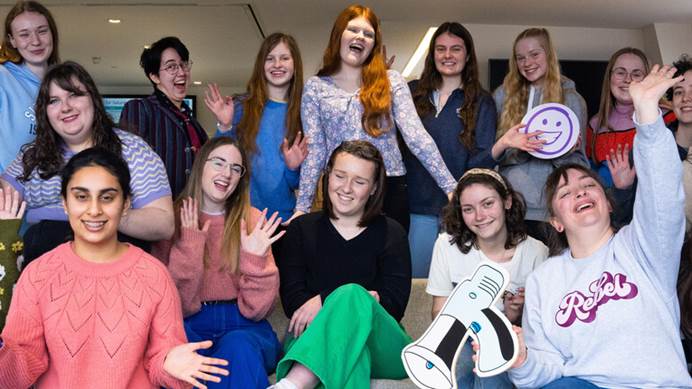What LGBT+ History month means to me
Abi, a Girlguiding Advocate who turns 19 this month, tells us why LGBT+ History month is still so important
![]() I have always felt connected with the month of February, my birthday is in this month, the fact it’s LGBT+ History month and I’m gay probably also helps.
I have always felt connected with the month of February, my birthday is in this month, the fact it’s LGBT+ History month and I’m gay probably also helps.
I love this time and the “Happy LGBT+ History month!!” messages which come with it, that I send and receive from my friends. The messages creates a sense of comradery amongst the LGBT+ people around me, as we are finally given a space in history to talk about what happened and what still needs to happen.
LGBT+ History Month allows us to look back to the past and reflect on how far we have come. From the days of being raided in small clubs with trans people of colour like Marsha P. Johnson and Sylvia Rivera leading the Stonewall riots which ultimately led to the liberation of LGBT+ people – things have changed a lot.
Speaking out is what made change to happen; this is why Girlguiding encourage girls to be loud and proud, and to use their voices for good.
Speaking out and coming out
Last year I came out (along with two of my friends) in an assembly to our whole school.
It wasn’t that I wasn’t out and proud already - most of my things are covered with rainbow stickers and badges - but hearing our real, honest stories meant that through that week we had a huge turnout to our events, and we heard from students who'd never spoken up before. It was blissful and for a whole week it felt like we had made some real change, it felt like people felt free to live their truth.
But the fact is, not everyone has this privilege; many LGBT+ people are being killed or made homeless simply for existing. And it’s worse for those who have intersectional identities; people of colour are systematically oppressed both from heterosexual institutions and LGBT+ communities as a result of institutionalised racism, despite being the major leaders and creators of the LGBT+ movement initially.
Additionally, important lessons like sex and relationships education are lacking in representation of LGBT+ relationships. The nurse that taught me even referred to the vagina as “lady parts” rather than using the anatomical terms and implied that heterosexual sex was “normal sex”.
Inclusive contraception isn’t available from clinics, nor your average supermarket - it’s solely found on Amazon, which isn’t always accessible to teens still living with their parents. Why should my friends be able to pop to Aldi for contraception while I have to wait 7-10 working days or pay extra for Prime?
A long way to go
We have come a long way since the days of Anne Lister, a historical lesbian from the Britain made famous by her diaries, in which she recorded details of her lesbian relationships. Her story was recently developed into a television series.
There’s a lot more LGBT+ representation in the media and laws are gradually changing to reflect modern society. But things still aren’t perfect. According to GLAAD, in America the life-expectancy of transgender women of colour is just 35 years old.
There are still huge changes which need to be made. Even in the UK it isn’t always safe to show your identity. Just last year, I was followed by a man through a shopping centre and onto a bus after kissing my then-girlfriend goodbye.
And who can forget the bloodied faces of Melania Geymonat and Christine Hannigan after they were attacked on a bus in London last year? This is why Pride is still a protest – not just a celebration.
We have a long way to go and until LGBT+ people are equal to their non-LGBT+ friends. LGBT+ History month must be celebrated so that we can keep going forwards rather than backwards.



